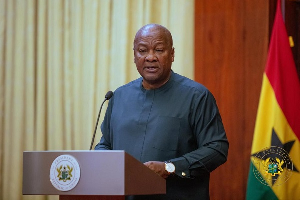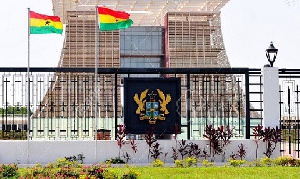In the run-up to election 2016, the then Vice President aspirant (current Vice President) held a series of lectures on the economy. Opposing political parties held the view that, the Economist (former BOG deputy Governor) was engaging in propaganda Economics and sometimes using different formulas to suit his argument.
There is this famous video in circulation was in one of Dr. Bawumia lectures, he made mention of “if the fundamentals are weak the exchange rate will expose you.” Fast forward 2018 Ex-President Mahama makes mockery of current Vice President Dr. Bawumia with his assertion of weak fundamentals and how the exchange rate is exposing the current Administration.
It’s evident that political policy has been vital in exchange rate management in Ghana, devoid of long-term strategic policy on Exchange rate management. In our country, what is primarily attributed to currency fluctuation is Balance of payment of deficit. Thus a change in a country balance of payment is likely to cause fluctuations in their exchange rate. About 90 percent of Ghana Economic sectors largely depend on import, i.e., from households, firms, and industry without a corresponding increase in export to bridge the gap of the deficit created with high import appetite.
In Feburary 2014, one of weird currency management policy the central Bank (BOG) implemented was the announcement that all authorized dealer banks and the general public that with effect from February 5, 2014, the rules governing the operations of FEA and FCA have been revised… on the pricing, advertising receipts and payments for goods and services in foreign currency in Ghana. The Notice states that all transactions in the country are required to be conducted in Ghana cedis, which is the sole legal tender. This approach was the regulator intervention to stabilize the free fall of the exchange rate the country was experiencing then; posterity will be the best judge of the action taken whether it lieu to the benefit of the citizenry.
The USDGHS decreased 0.0500 or 1.04% to 4.7700 on Monday, July 9 from 4.8200 in the previous trading session. Historically, the Ghanaian Cedi reached an all-time high of 4.82 in July of 2018 and a record low of 0.90 in July of 2007. (https://tradingeconomics.com/ghana/currency)
Critically evaluating the assertions on fundamentals which dominate in NPP assertion post 2016 election such as slow GDP growth rate; twin double-digit deficits in fiscal and current account balances, low growth in industry and agriculture and low gross and net international reserves, double-digit inflation, rising public debts and high levels of debt servicing as well as large and increasing central bank financing of fiscal deficits. Some of this depreciating fundamentals have been reversed, such as the double digit inflation, slow GDP growth and low growth rate in Agriculture sector.
Does the argument of Fundamentals have a positive correlation to Exchange rate still holds?
There have been quite some empirical studies on whether fundamentals predict exchange rates or exchange rate instead tends to predict fundamentals. Notwithstanding the argument of the then incumbent Government to causes of depreciating Cedi which was attributed mainly to dollarization and the structure of the Economy since the colonial era, the country hasn’t witnessed a shift towards that direction.
The country has been over-reliant on the export of raw materials such as Cocoa and Gold for a long period without tapping into other sectors to leverage the balance payment of payment deficit. The piecemeal approach to Exchange rate management by political actors, present short measures to score political advantage (point) instead of adopting a holistic view.
The public debt and high level of debt servicing, ie, the capital inflows and outflows of the economy as more Foreign currency is needed to finance repayments of debt which in effect increases the demand to supply causing fluctuations in exchange rate management.
The country needs a national plan (policy) to restrict the importation of items (Rice and Sugar) that can be produced locally and tax policy to make local manufacturers competitive. The incumbent Government widely campaign on the one district one factory, such manifesto promises should be fast track since it has the tendency of increasing basic production items (rice and sugar) which is on high demand and affect the balance of payment deficit.
Managers of the economy should adopt holistic view approach on the fluctuation of the cedi. Since the fluctuation of the cedi has a positive correlation in affecting every sector of the economy.
Opinions of Friday, 20 July 2018
Columnist: Yemoh Nii Mensah Benjamin



















